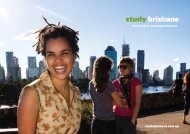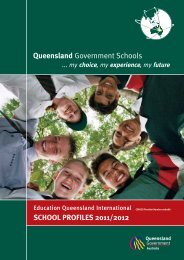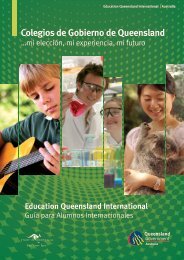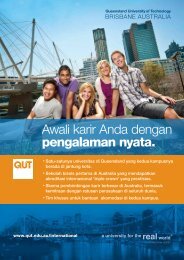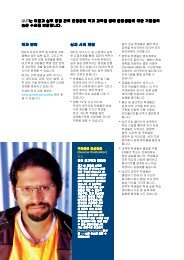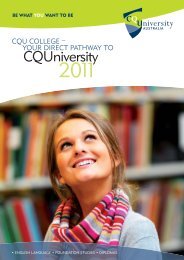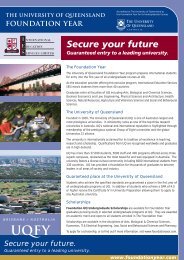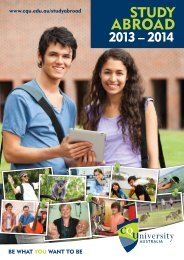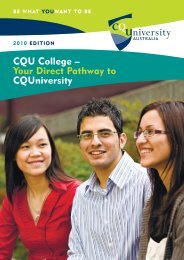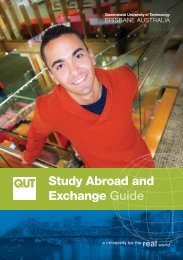UNDERgRADUATE PROSPECTUS - Study Brisbane
UNDERgRADUATE PROSPECTUS - Study Brisbane
UNDERgRADUATE PROSPECTUS - Study Brisbane
- No tags were found...
You also want an ePaper? Increase the reach of your titles
YUMPU automatically turns print PDFs into web optimized ePapers that Google loves.
Health<br />
Dual degree programs<br />
– Business Management<br />
Additional cost<br />
– Senior First Aid Certificate (including CPR)<br />
(approximately $155)<br />
International contact details<br />
International Student Advisor<br />
Online: www.uq.edu.au/international/enquiry<br />
Phone: within Australia (free call): 1800 671 980<br />
Outside Australia: +61 3 8676 7004<br />
Bachelor of<br />
Health Sciences<br />
Program code 2252<br />
Location Ipswich<br />
Commencement semester 1, 2<br />
Duration Three years full-time<br />
Admission requirements Year 12 or equivalent<br />
English (see page 92). It is highly recommended that<br />
students undertake one of Year 12 or equivalent<br />
Chemistry, Physics, Biology or Multistrand Science.<br />
Honours Available as an additional year of study<br />
Program outline<br />
The Bachelor of Health Sciences provides a broad<br />
overview of health care, and will be particularly<br />
suited to you if you intend to enrol in a postgraduate<br />
professional degree (e.g., medicine, allied health,<br />
public health, dietetics) or wish to enter the nonclinical<br />
health workforce (e.g., health promotion,<br />
health management) planning and delivering efficient<br />
quality health care.<br />
If you are seeking a clinical career, you may<br />
initially enrol in the Bachelor of Health Sciences<br />
and then, after graduation, pursue a clinical<br />
postgraduate or graduate entry degree, depending<br />
on academic performance. If you have a high<br />
academic performance, you may seek to transfer<br />
into a clinical undergraduate program while enrolled<br />
in the Bachelor of Health Sciences. If you are within<br />
the Year 12 Provisional Entry quota for Medicine, the<br />
dual degree Bachelor of Health Sciences/Bachelor<br />
of Medicine/Surgery is available. This program will<br />
provide you with a solid grounding in preventive<br />
health care, and is considered one of the preferred<br />
pathways to a medical career.<br />
Some elective courses are only available at the St<br />
Lucia campus. For more information, see:<br />
www.uq.edu.au/health/sciencesdegree<br />
Placement courses<br />
HLTH3001 Practicum in Health Sciences has been<br />
developed to provide final year Health Sciences<br />
students with hands-on experience in a healthrelated<br />
work environment. You will use your<br />
accumulated knowledge and skill base to prepare<br />
for future employment and will learn important<br />
vocational skills. You must hold a Blue Card<br />
(Working with Children Check) and a Hepatitis B<br />
vaccination (Queensland Health request).<br />
Some elective courses are only available at the St<br />
Lucia campus.<br />
Majors<br />
Health Promotion and Population Health<br />
In this major, you will examine how health services<br />
(e.g., aged care) and programs (e.g., anti-smoking<br />
campaigns) are designed and delivered, their<br />
effectiveness, and how they are evaluated and<br />
modified to improve service and program outcomes<br />
to facilitate community health and prevent disease<br />
and disability. Health Promotion and Population<br />
Health graduates aim to improve the health of the<br />
entire population and to reduce health inequities<br />
among population groups.<br />
Health Services Management<br />
As a future healthcare manager, you will learn how<br />
to plan, manage and evaluate health services to<br />
ensure the goals for quality of care, costs, ethical<br />
issues, equity and legislation are met. You will<br />
gain in-depth knowledge of these issues and the<br />
skills to critically analyse situations during your<br />
program, which will be very useful for your later<br />
work in managing the financial or human resource<br />
aspects of providing service within a public or<br />
private hospital; establishing, maintaining and<br />
evaluating community health programs such as new<br />
immunisation programs; managing private health<br />
insurance companies; and working with clinical<br />
teams to develop information technology initiatives<br />
such as e-health.<br />
Indigenous Health<br />
The Indigenous Health major provides in-depth<br />
knowledge and skills related to key aspects of public<br />
health practice applied to Indigenous populations:<br />
health promotion, social science, policy, and services.<br />
Units of study are devoted to some of the specific<br />
health issues that are important to Aboriginal and<br />
Torres Strait Islander communities: nutrition, alcohol<br />
and substance use, and communicable disease<br />
control. These can be expanded upon with further<br />
elective study. The major also offers the opportunity<br />
for individual experience within an Aboriginal and<br />
Torres Strait Islander organisation. The Indigenous<br />
Health major will equip you to work within Indigenous<br />
organisations, and also in a range of mainstream<br />
settings where your awareness of issues and practice<br />
will promote improved engagement of Aboriginal and<br />
Torres Strait Islander people. The major will enhance<br />
your readiness for remote community work.<br />
Nutrition<br />
Human nutrition is a global term that concerns<br />
the way that foods and nutrients are acquired and<br />
used. It includes studies in biomedical science,<br />
biochemistry, nutrition, behavioural sciences<br />
and food sciences. The Nutrition major includes<br />
supporting studies in health systems, public health,<br />
and Indigenous health. This will enable you to<br />
work as a community nutritionist, encouraging<br />
the population to achieve healthier eating and<br />
reducing the burden of diet-related disease. The<br />
degree provides the basis for further studies in<br />
public health, health management or research.<br />
The Bachelor of Health Sciences with the Nutrition<br />
major is a recommended pathway to the Master of<br />
Dietetics Studies, and satisfies all the prerequisite<br />
courses required for that program.<br />
Career opportunities<br />
Public and private healthcare sector dealing with<br />
health issues as varied as anti-smoking campaigns,<br />
communicable disease, drug and alcohol use,<br />
Indigenous health, chronic disease, and women’s<br />
health.<br />
Graduates seeking non-clinical careers in health<br />
care will find employment in the broad areas of<br />
health promotion or health services management,<br />
and will be at the front-line in improving delivery of<br />
health care through their roles as health promotion<br />
officers, health managers and health researchers.<br />
Specialist areas:<br />
Specialist areas:<br />
Health Promotion and Population Health:<br />
health promotion practitioners and educators,<br />
community health officers, policy officers, program<br />
evaluators, project officers and consultants in<br />
both public and private sectors, including state<br />
and federal health departments, population<br />
health units, community health centres, divisions<br />
of general practice, non-governmental health<br />
organisations, and international health agencies.<br />
Health Services Management: Government and<br />
non-government organisations: managing the<br />
financial or human resource aspects of service<br />
provision within a public or private hospital;<br />
establishing, maintaining and evaluating community<br />
health programs, such as new immunisation<br />
programs; managing private health insurance<br />
companies; and working with clinical teams to<br />
develop information technology initiatives, such as<br />
e-health.<br />
Nutrition: Health promotion or community health.<br />
Dual degree programs<br />
– Medicine/Surgery<br />
International contact details<br />
International Student Advisor<br />
Online: www.uq.edu.au/international/enquiry<br />
Phone: within Australia (free call): 1800 671 980<br />
Outside Australia: +61 3 8676 7004<br />
Bachelor of<br />
Health, Sport and<br />
Physical Education<br />
Program code 2313<br />
Location St Lucia<br />
Commencement semester 1<br />
Duration Four years full-time<br />
Admission requirements Year 12 or equivalent<br />
English and one of Biological Science, Chemistry or<br />
Physics (see page 92)<br />
Honours A modified program of study in Years 3<br />
and 4, with entry based on grade point average<br />
Program outline<br />
The Bachelor of Health, Sport and Physical Education<br />
is designed to prepare you for a career in the health<br />
and physical education field. It will also prepare you for<br />
professional practice in sports education and related<br />
areas (i.e. sports coaching and health promotion).<br />
During this program, you will undertake significant<br />
professional practice in a range of vocational settings<br />
from primary and secondary schools; the sport,<br />
health and fitness industry; to sports associations.<br />
Practical experience complements in-depth learning<br />
of the complex and diverse nature of human<br />
movement, from physiological, biomechanical, sociocultural,<br />
psychological, teaching (pedagogical), and<br />
health perspectives.<br />
This program emphasises the essential skills<br />
that are valued by employers such as planning,<br />
organisation, presentation and problem-solving,<br />
thus enhancing your self-confidence and<br />
employability. You will be encouraged to critically<br />
appraise, question and lead change in education,<br />
innovations and research.<br />
In this program, you can study a diverse range<br />
of courses, including biomechanics, motor control,<br />
exercise physiology, physical activity and health,<br />
psychology of sport and exercise, youth, sport and<br />
physical education, and pedagogical applications in<br />
human movement.<br />
Placement courses<br />
Third-year placement consists of a minimum of four<br />
weeks of practice. You will observe a primary program<br />
for five days, participate as a staff member at a<br />
secondary school for at least 10 days, and spend 40<br />
hours in other approved educational settings.<br />
Fourth-year placement is a course that will immerse<br />
you in the life of a school for 10 weeks, particularly the<br />
responsibilities of the Health and Physical Education<br />
(HPE) Dxepartment. You will actively participate as a<br />
staff member for a total of 50 days, teaching a full load<br />
by week five in HPE and Junior Science.<br />
Additional information<br />
You must have a current Blue Card (Working with<br />
Children Check) before beginning your placements<br />
with children.<br />
UNDERGRADUATE <strong>PROSPECTUS</strong> FOR INTERNATIONAL STUDENTS 2012<br />
53



